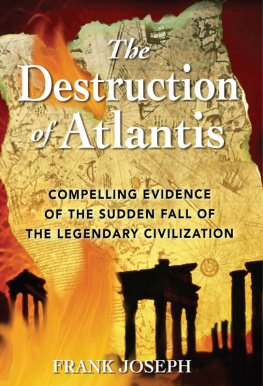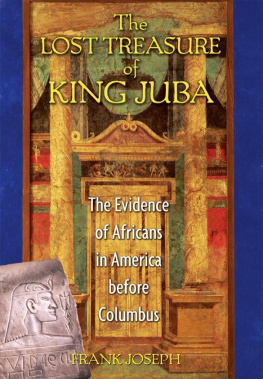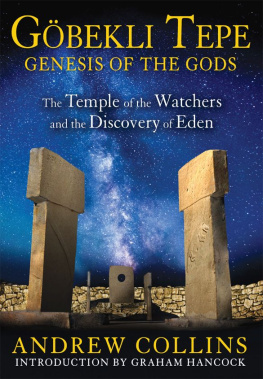BEFORE ATLANTIS
Making use of extensive evidence from biology, genetics, geology, archaeology, art history, cultural anthropology, and archaeoastronomy, Frank Joseph offers readers many intriguing alternative ideas about the origin of the human species, the origin of civilization, and the peopling of the Americas.
MICHAEL A. CREMO, COAUTHOR OF THE HIDDEN HISTORY OF THE HUMAN RACE AND AUTHOR OF FORBIDDEN ARCHEOLOGY
Staggering in scope, Before Atlantis provides compelling evidence that there is a much richer and deeper story of our world. By setting back the clock for our civilization and species, Frank Joseph builds a foundation on which the new history of the world will be written.
STEVEN SORA, AUTHOR OF THE LOST TREASURE OF THE KNIGHTS TEMPLAR AND REGULAR CONTRIBUTOR TO ATLANTIS RISING
Frank Joseph has come up with another tour de force about ancient seafarers and early migrations across the oceans in his new book, Before Atlantis .
GUNNAR THOMPSON, PH.D., AUTHOR OF COMMANDER FRANCIS DRAKE & THE WEST COAST MYSTERIES, SECRET VOYAGES TO THE NEW WORLD , AND NU SUN: ASIAN-AMERICAN VOYAGES, 500 B.C.
T. E. Lee, Warren King Moorehead, Marcelino Sanz de Sautuola, Virginia Steen-McIntyre, and all those martyrs of discovery whose professional careers were destroyed by their mainstream colleagues for daring to challenge prevailing academic dogma with facts later proved correct.
Contents
INTRODUCTION
Godhood or Extinction?
If you would understand anything, observe its beginning and its development.
ARISTOTLE, METAPHYSICS
It is impossible to determine who we are, how we got here, or where we are going unless we know from where we came. An individual ignorant of his or her own past would be utterly lost, unable to plan for the future. So too, we, as a people, cannot make sense of the social, economic, and even environmental deterioration developing around us, because the energies that molded civilization and our very bodies and brains are not properly understood.
Happily, the outline of those critical energies is beginning to emerge clearer than ever before, thanks to some very recent discoveries. These discoveries are mostly given short shrift by the purveyors of public information, but they are emphasized here in detail, because they radically revise inadequate presumptions about human origins. Among the most surprising of these discoveries is our evolutionin water.
An aquatic phase had been postulated as long ago as the sixth century BCE; presented here is fresh evidence to show that early humans repeatedly returned to hydrospheric environments for evolutionary developmentand to such an extent that our present physical and psychological configurations were formed by these encounters. Moreover, we appear to have been neither the first nor the only humans who walked the Earth, as borne out by finds in Oklahoma, Argentina, and elsewhere, predating our evolution by millions of years.
Before Atlantis challenges current paleoanthropological arguments on behalf of East Africa as the birthplace of Homo sapiens, pointing instead to Southeast Asia, where the most terrific volcanic eruption Earth ever experienced abruptly reduced humanity from two million individuals to a few thousand, worldwide. Pushed to the very brink of extinction, our species gradually recovered to develop the first high culturenot 5,500 years ago in the Near East, as textbook archaeologists would have it, but seventy centuries earlier, in Indonesia and the Central Pacific.
Before Atlantis offers the most comprehensive andso far as this author knowsthe only description of Stone Age sites around the world, thereby demonstrating that the so-called megalith-builders were transoceanic seafarers who circled the globe during the mid-fifth millennium BCE to create the first global civilization. An ultimate secret locked in their immense monoliths is revealed by examining the altered states of consciouness still generated by these powerful monuments. Nor was Christopher Columbus the first overseas visitor to America from the Old World. His arrival in 1492 was preceded by ice age Europeans, as proved by an abundance of their remains newly found from the Carolinas to Brazil.
We learn the real identity of the Garden of Eden, and the location of its well-preserved ruins, as excavated by university-trained archaeologists. The profound antiquity of Atlantis herself emerges with the first Atlantean an astounding 350,000 years ago.
These latest paradigm-shattering discoveries are transforming long-established versions of the past, and together comprise the New History. In it, we behold our true reflection as a young, civilizing species with a godlike destinynot an old, failed primate doomed to self-destruction. The following interpretations and conclusions based squarely on fresh information accomplish for us what an appreciation of the past is meant to provide; namely, a well-defined examination of mankinds dramatic origins that shaped and continue to mold our identity and the world in which we live.
Accordingly, Before Atlantis is an ambitious undertaking, aimed at an expansive, comprehensive, yet close-up panorama of our beginnings as a species and subsequent course of human evolution, through our earliest cultural efforts and first civilization. As such, it endeavors to determine what made us different from all other creatures, how we arrived in our present condition, and where we are headed.
Evolutionary Baptism
It is hard to resist the conclusion that something must have happened to the ancestors of Homo sapiens which did not happen to the ancestors of gorillas and chimpanzees.
ELAINE MORGAN, THE AQUATIC APE
Deeply engraved in childhood memories is one of my lifes breakthrough momentsthe kind of insight that drastically transformed my view of the world forever after. It occurred when I was eleven years old during a family outing to the Field Museum of Natural History, at Chicagos lakefront. I knew and revered the awesome, old institution of ancient Egyptian mummies and the far older dinosaur fossils from many previous visits, but I had never before noticed a large, glass display case containing ten or twelve mounted skeletons standing in a row. The one at the far end, to my right, seemed familiar, and my suspicions were confirmed by a small brass tablet at its feet that read, Modern Man. Beside him stood a remarkably similar specimen, not quite as tall, but more robust. Another plaque identified it as an ape. The next nearest bones belonged to a gorilla, followed by those of a chimpanzee, then an orangutan, monkey, and perhaps five or six other sets, side by side.
Staring at these gaunt, motionless remains for the first time, a powerful sense of awareness began to dawn in my mind, until I almost cried out in recognition, Theyre all related! The natural progression of skeletons from left to rightfrom lowly primate to human beingseemed conspicuously obvious. Until then, my only familiarity with human creation was the story of Adam and Eve, a version of events suddenly vaporized by my discovery. In that moment, evolution irrevocably stamped itself on my consciousness as an incontrovertibleindeed, self-evidentfact of life.
I have since learned how the mainstream view of human evolution holds that climate change deforested much of Central and East Africa about 6 million years ago, driving our apish ancestors from their former existence amid the trees into the open savannahs. They adapted to this less abundant, more perilous environment by becoming first scavengers, then hunters. A developing, upright posture allowed food to be carried away while running, and, when standing, provided a better perspective for prey or danger.






